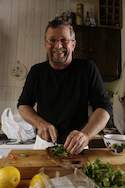It was on one such trip in 1999 that he fell in love with the Rhone. He worked a harvest, his first overseas, at Demaine Brussel. 'It's near Gigondas, in the lower Rhone. It was one of the most enjoyable experiences of my life.' Which is why he eventually chose to start his Solo career with Rhone classics: a syrah and viognier.

'I like the friendliness of syrah; it's not a hard, stark variety like cabernet or merlot, which I prefer as part of a blend. Without emulating, I'm trying for the more elegant, fruity, savoury Côtes du Rhône style rather than the rich, peppery northern Rhône.'
Phillip Costandius viognier is lower in alcohol, with far less wood, for a lighter, racier, fruitier style than the fat, high-alcohol wines made here to date. 'Mine is a food wine, made for enjoying the whole bottle rather than just a glass or two.'
It gives insight into the man's personality - understated, cautious - that he consciously chose not to bottle wines under his own name. 'It's about the wine, not me. I want to develop a brand with longevity based on the quality of the wine, irrespective of the person who makes it.'
The label is simple, strong. 'I read about a successful retail chain's "2m" rule: your label must be the one to catch the eye of someone standing more than 2m away from a shelf full of different brand names. It works. And my wife Elmarie, an artist, had a hand in it.'
The small 'Bethlehem' star up in one corner has no overt religious connotation. Rather it reflects the concept of reaching for something seemingly unattainable, striving for quality (with the concomitant allusion to star ratings). 'But my birthday happens to be on 6 January, which is probably the most religious holiday on the Greek Orthodox calendar, when the Day of the Epiphany is celebrated.'
Phillip Costandius's paternal great-grandfather was from the Greek island of Lesvos. A large, framed sepia photograph of him and his wife hangs on the wall of the tiny, cosy Costandius living room/dining room. 'People always say I look like him. My eldest son, Nicholas, definitely does.'
Nicholas is a flight instructor. 'He has always been passionate about flying. It's lovely to see. It's such a pleasure to see people be sure about what they want to do with their lives.' The vintner's second son Simon is a liberal arts student at Varsity College in Cape Town.
The first one in my family to research our roots. I've been to Lesvos twice; it was an enriching personal journey.'
His grandfather came to South Africa in the early 1900s as a 17-year-old, settled in Paarl, and, like many Greek immigrants, opened a cafe. It was called the Elite and was soon followed by the Arcadia. 'The Arcadia is still there; it's some sort of "sports bar" now ... In those days cafes were like general dealers and usually had a tearoom.' He still uses some of the traditionally scalloped plates nostalgically bearing the name 'Elite' in the floral script.
Phillip Costandius describes his grandfather as 'Spatz' Sperling on overdrive. 'I think it's why I understood Spatz! Every single Sunday the whole Costandius clan had to "report" to my grandfather's house for lunch. There would be a table groaning with food. He'd insist we "eat, eat!" and we'd end up stuffing ourselves. It was only later that I learned to appreciate flavours more than quantity!
'Food was always very important in our house. We all grew up learning how to do things with our hands, be self-sufficient, which included being in the kitchen. It was the old European ethic of self-sufficiency and hard work. My father was a hospital administrator, but he also did a lot of carpentry in his spare time.'
'I've had an idea to see how Greek grape varieties do in the Cape. Assyrtiko, for example, makes a fresh wine similar to sauvignon blanc, but not as acidic, and would be suited to our Mediterranean climate.'
 Peruvian ceviche recipe by Phillip Costandius paired with Solo Viognier wine....
Peruvian ceviche recipe by Phillip Costandius paired with Solo Viognier wine.... Casserole with venison, lamb and pancetta recipe by Phillip Costandius paired with Solo Syrah wine....
Casserole with venison, lamb and pancetta recipe by Phillip Costandius paired with Solo Syrah wine....